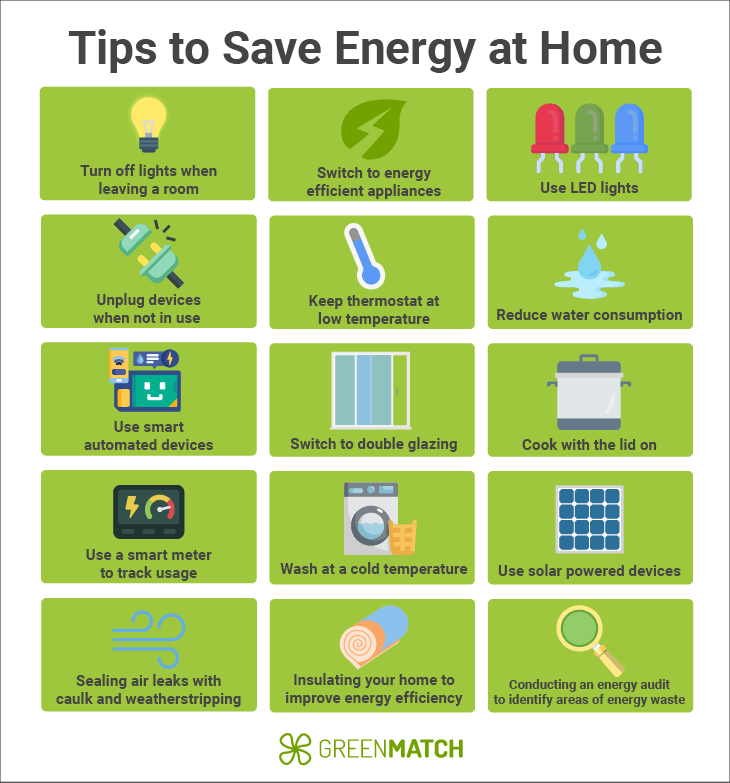- GreenMatch
- Blog
- How To Save Energy at Home
15 Energy Saving Tips for Your Home

Have you ever wondered how small changes in each home can significantly impact the environment?
There are numerous tips on home energy conservation, from small daily habits to big investments that help the environment and reduce your energy bills. So, what are some simple tips to reduce energy consumption at home?
This article is based on the opinions of 20 green enthusiasts who share amazing tips and opinions on living a sustainable life by consuming less and transitioning towards renewable energy sources.

If you would like to use this infographic on your website, use the embed code below:
We asked 20 professionals in the clean energy niche to tell us their tips and opinions on how we can save energy at home, either by switching to renewable energy sources or energy-efficient appliances.
From turning off lights when leaving a room to investing in solar panels, here’s what they have to say about moving towards energy-efficient home improvements.
How to Save Energy at Home?
1. Turning off the lights when leaving a room
A basic habit to develop and foster is to make sure that you always turn off the lights when leaving a room. Make a reminder to do so until you get into a habit of doing so subconsciously. You can save a good chunk of your monthly electricity costs by doing something as simple as this regularly.
2. Use LED lights
Many homes are moving towards smart LED lights as they not only look stylish and affordable but are also way more efficient than halogen bulbs. Morevove, replacing traditional incandescent bulbs with energy-efficient LED bulbs can significantly reduce your electricity usage. LED bulbs consume up to 90% less energy and last much longer.
3. Switching to efficient appliances
Dryers and refrigerators are two of the most energy-intensive appliances in a home and replacing these with better efficient models can cut the electricity usage by half, thereby reducing your electricity bills. Installing an air source heat pump in the UK is another idea to reduce electricity consumption. In general, maintaining and replacing appliances every few years will make them have less burden on your electricity usage. You only need to consider the heat pump costs.
4. Unplug devices
Needless to say how important it is to unplug devices when not in use. Do not leave devices on standby but rather unplug them and save your electricity bill, and the planet. Even when not in use, devices like TVs, computers, and chargers consume standby power, known as "vampire energy." Unplugging these devices when not in use can save up to £80 (£108) per year on your electricity bill.
5. Lessen water usage
Some easy fixes to reduce your water consumption could be taking quick showers, using just the required amount of water while cooking and turning off running taps when unused even for seconds.
6. Keep the thermostat at a lower temperature
Aim to keep your thermostat at a lower temperature around 17 degrees, this can make a big difference and save your energy costs. Each degree of adjustment can save around 3% on your heating and cooling cost. This means that, lowering your thermostat by just 1°C during winter and raising it by 1°C during summer can save up to £80 per year on heating and cooling cost. Using a programmable smart thermostat is even better.
7. Use smart automated devices
Smart automated devices can lower your energy bills even when you forget to. Smart automation systems will detect when you’re no longer using a device and turn off the power supply. Programmable thermostats automatically adjust temperatures based on your schedule, ensuring efficient heating and cooling when needed, saving up to £150 annualy.
8. Use double glazing door
Double glazing doors and windows are a perfect solution for a modern home as they can significantly reduce the emissions of greenhouse gases from heating and cooling thereby reducing your carbon footprint and also lowering your energy bills.
9. Cook with the lid on
This is a super simple hack in everyday life to save energy consumption, by cooking with the lid you are making sure to lessen the cooking time and water usage significantly.
10. Using smart meter
A smart meter is a great way to see how much power you’re consuming, this will help you keep a track of your consumption in real-time, and where you can reduce it.
11. Washing at low temp
Wash clothes at a cooler temperature and with a full load, you will be saving a lot of water and electricity.
12. Solar-powered devices
These days you can find a solar-powered version of almost any electronic you use in your home. Making small shifts and using more solar-powered electronics can go a long way and can also lower your maintenance and replacement costs of such electronics.
13. Seal air leaks
Drafts from windows, doors, and other openings can cause your heating and cooling systems to work harder, increasing energy consumption. Sealing these air leaks with caulk or weatherstripping can improve energy efficiency, reduce your bills and save up to £100 annually.
14. Insulate your home
Proper insulation in walls, attics, and crawl spaces can reduce heating and cooling costs by up to 30%, resulting in significant savings on energy bills. Also, insulating water heaters can reduce heat loss and save up to £40 per year on energy costs.
15. Conduct an energy audit
Hiring a professional to conduct an energy audit can identify areas of energy waste and provide recommendations for improving efficiency, potentially saving hundreds of pounds on energy bills.
Top Alternative Sources of Energy for Homes
Solar Panels
Solar panels top the list of the most popular alternative sources of energy that can be used in a home. Considering that you can power your house with a few panels if you’re looking for a small jump in energy efficiency, the best solar panels are a good way to start moving off the grid and consuming a better source of electricity. There are many advances in solar photovoltaic technology and tax incentives to attract more homeowners.
Costs of solar panels in the UK have halved in the past decade, so many people are considering opting for cheap solar panels on their roofs to generate their own clean and renewable electricity.
Wind Turbine
Using wind turbines to generate electricity will greatly depend on where you live. Installing small wind turbines in your home is a great eco-friendly option for those living in places with good wind speeds.
Geothermal Power
Using geothermal power to heat and cool your home is a much more efficient way of investing in energy efficiency. Ground source heat pumps provide consistent heating and cooling throughout your house and are durable and efficient, letting you reap their benefits for decades.
Individual Homes Can Make a Difference to the Environment
Emitting Fewer Pollutants and GHG
Energy efficiency means using less energy, requiring less electricity generation and emitting less CO2 and other pollutants. Regardless of the methods homeowners use to make their homes more efficient, any reduction in energy consumed directly reduces a home's energy-related carbon emissions. This correlates to a reduction in greenhouse gasses released into our atmosphere and an overall improvement in human health and our environment.
Tips to Improve the Energy Rating of Your Home
Living in energy-efficient houses puts individuals into a more favourable position by having lower heating and electricity bills, staying more comfortable and safe during unexpected blackouts, increasing the house's resale value, and ultimately bringing benefits to one’s health. Not only are these types of homes beneficial for their owners but also for the environment. From the viewpoint of the energy system, energy-efficient houses can actively help the power system by demanding less electricity from the grid in times of shortage and supplying this valuable commodity into the system, thus helping it once it is needed.
Consume Less Energy from the Grid
Get an energy assessment done for your house to see where you can cut down on your consumption and build up your energy score. There are numerous ways to save energy and consume less from the grid. Moreover, using smart power strips automatically cuts power to devices not in use, eliminating phantom power consumption and saving up to £45 per year.
Replace Windows with Modern, Efficient Double Glazing
Another way to increase your score is by investing in solid double glazing for your windows and doors that are more modern and efficient. New windows cost can be low with the help of grants.
Energy Smart Landscaping
Smart landscaping design can make your home energy efficient in terms of heating and cooling, increasing your energy score, making your home look great, and adding beauty.
Wall Insulation
Both loft insulation and wall insulation can reduce your energy bills and help lower your consumption, especially in the case of older homes that are not constructed in an energy-efficient manner. This is a good way to boost your score and renew your home to be more energy-efficient. Proper insulation in walls, attics, and crawl spaces can reduce heating and cooling costs by up to 30%, resulting in significant savings on energy bills.
Smart Devices
Every modern home buyer is looking for smart homes that ease their lives and reduce their carbon footprint. Smart devices detect power usage and turn them when not in use. Humans may forget, but they don’t, and who doesn’t want them in their house? A smart home will only increase in demand and is a good way to increase your home value.
We would like to thank all the following experts, eco-friendly enthusiasts and green bloggers for their opinions and contributions.
Tim De Chant futureproofreviews.com | John Goodman johnlgoodman.com | Aaron Hardy axionpower.com | Mike Bumgardner wbmgroup.com |
Matthias energyrates.ca | Justin Dring energisecontracting.co.uk | Alex Fraind kleverness.com | Nicholas Failla urban.com.au |
Adeel Shabir mycentriq.com | Louis Watton shiply.com | George Riley spiritenergy.co.uk | Glenn Wiseman tophathomecomfort.com |
Cassy Aoyagi usgbc-la.org | Ryyan Murphy irishheatandair.com | Jesse Hitchcock energyxsolutions.com | Ian Wright britishbusinessenergy.co.uk |
Vladimir Miskovsky fuergy.com | Cisco DeVries ohmconnect.com | Adam Justice iot.connectsense.com | Brenda Cuby thegreenfamilia.co.uk |

Valli has been writing well researched articles about renewable energy, sustainability and green technologies for GreenMatch since 2017. Her work has been published in various media such as Entrepreneur, Business Insider, Canadian Geographic, uSwitch, and eCycle.
We strive to connect our customers with the right product and supplier. Would you like to be part of GreenMatch?


